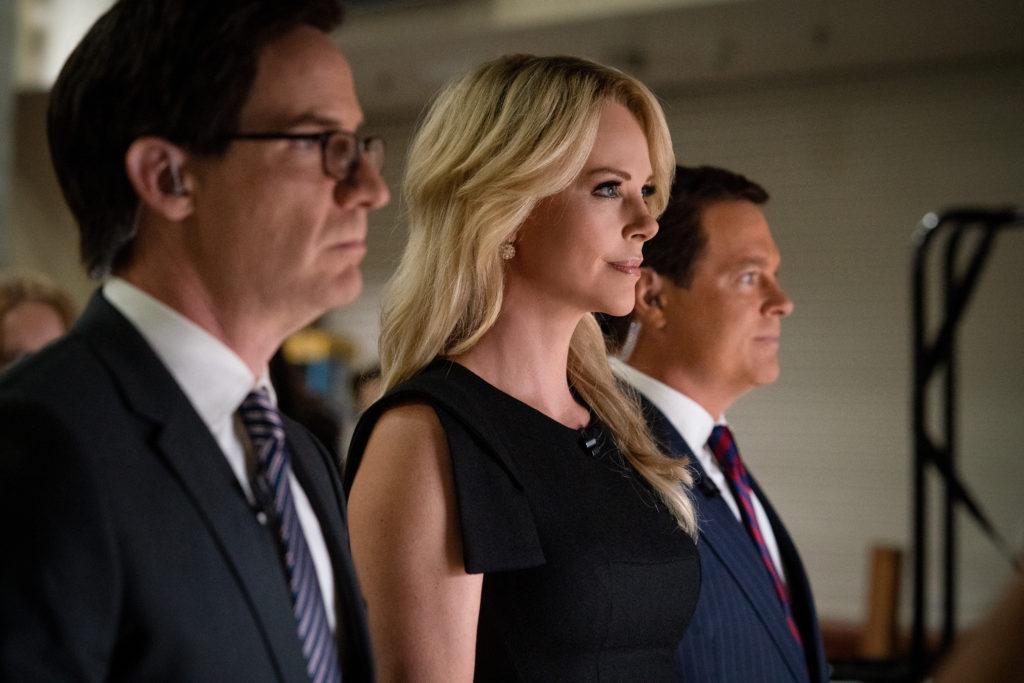Bombshell

Charlize Theron in BOMBSHELL. Photo: Hilary Bronywn Gale. ©2019, Lionsgate Films.
“Here’s the one thing you probably know about me. I have a big mouth,” says Megyn Kelly (Charlize Theron) in a freeze-frame moment—a trope that’s become a meme. In one of many fourth wall-breaking scenes, Kelly gives us a tour of News Corporation’s headquarters at 1211 Avenue of the Americas, as well as a crash course in how its Chairman, Roger Ailes (John Lithgow), came to power.
BOMBSHELL dramatizes the accumulation of sexual harassment allegations that surfaced against Ailes, who worked for the Nixon, Reagan and Trump administrations as a speechwriter and strategist. He’s credited by some with creating the modern Town Hall debate format. The film insinuates that Ailes was behind the Willie Horton ads run by George H.W. Bush’s campaign against then-candidate Bill Clinton.
From 2006 to 2016, Ailes intimidated, harassed and made sexual advances on at least two dozen women at the company, including Fox & Friends co-anchor Gretchen Carlson (Nicole Kidman). The film recounts the events leading up to Kelly’s confrontation with Trump at the Republican National Convention, aired on Fox News and moderated by Kelly, Bret Baier, and Chris Wallace.
When she challenges then-candidate Trump on his record with women, the litany of sexist remarks she quotes elicits cheers from his supporters. Stunned in the control room, Ailes soon catches up. “Great TV,” he observes, as does Carlson. “Nobody stops watching because of a conflict,” says Ailes. “They stop watching when there isn’t one.”
What Carlson and Kelly share in common, along with many other well-coiffed women, conspicuously seated behind desks without privacy barriers, is that they’re the bait—not exclusively in the sense of luring viewers into an era of conflict-driven media engagement.
Referencing Fox correspondent Rudi Bakhtiar’s allegations of harassment by Brian Wilson—asking favors in exchange for a choice seat on the D.C. bureau—attorney Nancy Erika Smith (Robin Weigert) notes, “She proved what they wanted her to prove. No one really wins by suing Fox News… Colleagues you admire will say you’re a superior, ambitious woman who’s suing because her career stalled.”
“Let ’em,” replies Carlson.
She kept copious notes and documentation of conversations dating back several years. To get around her contract’s arbitration clause, Carlson’s legal team files suit against Ailes on July 6, 2016, which attracts the attention of Kelly and other women harassed by Ailes over the years.
Directed by Jay Roach (TRUMBO, MEET THE FOCKERS) and written by Charles Randolph (THE LIFE OF DAVID GALE), the movie leans into Fox News’ editorial style—quick and gimmicky transitions, innuendo-laden exchanges. A gag about second base goes on far too long and undercuts the scene—Carlson authorizing her lawyers to go forward. Why? If the movie isn’t going to play well to audiences cowed by Fox’s anti-intellectualism, then where do they go with these “gags”? The glib tone risks trivializing sexual harassment and the boys club workplace environment so many times, even when Kelly’s debating coming forward we don’t grasp the hell she endured up to this point. And I say that as someone she blocked on social media for calling out her racist pandering.
Almost every major beat, and a few minor ones, can be found in a single source—Gabriel Sherman’s Sept 5, 2016, piece in New York Magazine, titled, “The Revenge of Roger’s Angels.” It’s as though Roach and Randolph hardly researched much else in this scant, sensational noisemaker.
The film explores sexual harassment at a network populated almost exclusively by white people, and particularly the kind of blonde, attractive women that Ailes reasoned his viewers would gravitate toward. The non-intersectionality trivializes the racism and sexism perpetuated by Megyn Kelly, who pitches to Ailes and Senior VP Bill Shine (Mark Moses) her now-infamous (and nonsensical) claim that Santa Claus is white.
Why choose Kelly’s point of view when you’ve cast a third, fictional perspective to focus the viewer wherever the screenwriters and director wish? Kayla Pospisil (Margot Robbie) isn’t a real person but a conglomeration of women among the two-dozen who eventually came forward in the suit against Ailes. Standing in the rain outside a crowded restaurant, Kayla calls her girlfriend, Jess (Kate McKinnon), to ask if she told anyone about Ailes’ advances. Kayla decides to call the Paul/Weiss Law Firm. Breaking down, she confesses, “I did it. I gave in to him.”
Earlier in the film when we see Bakhtiar, her name is only said in passing. We don’t know that she’s an Iranian-American who took assignments in Europe, Africa, and the Middle-East before coming to Fox. We only know her as a footnote for the advancement of Kelly and Carlson’s story.
The film curiously avoids epilogue. The footnote reads that Ailes received a larger severance package than Kelly or Carlson’s settlements. It stops there. No mention of Ailes’ death, Kelly’s short-lived post-Fox career, or Fox’s shift further rightward since the outcome of the 2016 Presidential election. Instead, using Ailes’ $40 million severance as the punchline, BOMBSHELL proves that even when white male filmmakers shout from a woman’s rooftop—Megan Ellison financed and Theron produced—they won’t let her have the last word.